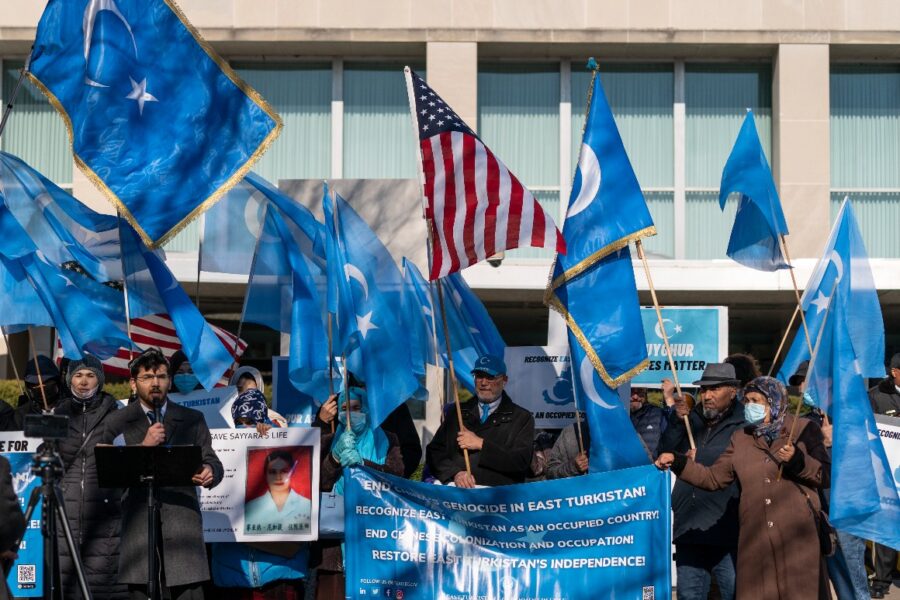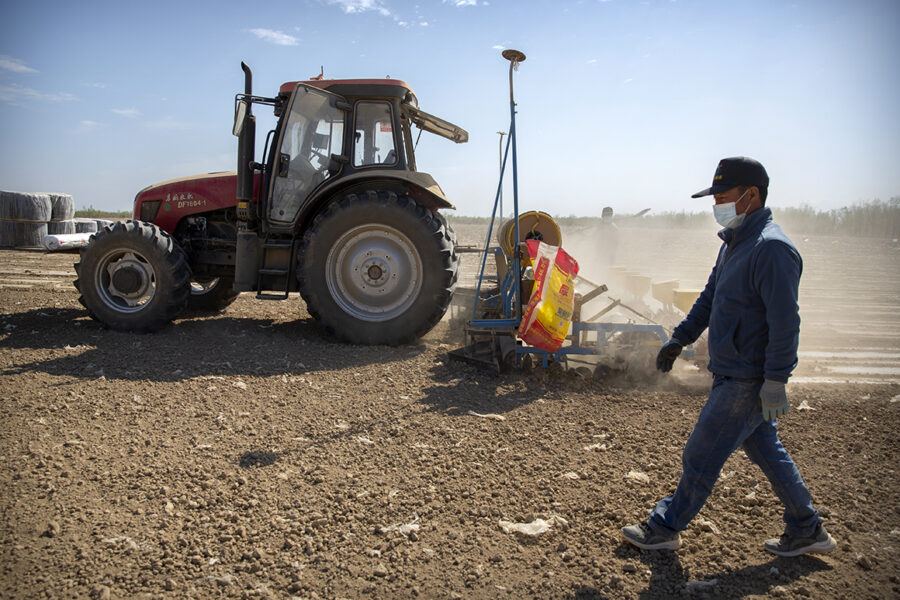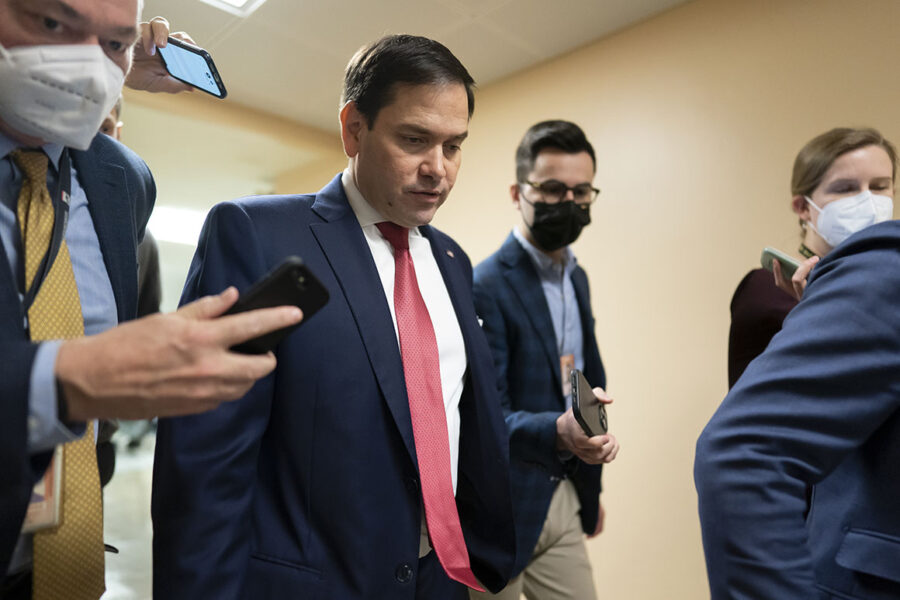New law to combat forced labor in China sparks enforcement debate

President Joe Biden on Thursday signed a bill to curb forced labor in China that U.S. business groups and trade experts warn will inflict unnecessary pain on U.S. firms and punish legitimately employed Uyghur Muslims in China’s Xinjiang region.
The Uyghur Forced Labor Prevention Act, which was approved after more than a year’s delay, is designed to insulate U.S. companies and consumers from complicity in forced labor practices in Xinjiang. The U.S. government has concluded that the practices are among abusive state policies targeting Uyghurs that constitute genocide.
But industry groups and trade lawyers say the law’s strict compliance standards coupled with problematic Customs and Border Protection enforcement will harm both U.S. business interests and Uyghur Muslims. Corporate sensitivities toward the bill’s impact on their China operations were underscored Thursday when Intel issued a public apology via its Weibo social media account for a recent letter it sent to suppliers instructing them to stop sourcing labor and products from Xinjiang.

The law will “shift the burden to companies to show that there’s not a use of forced labor in a region’s [products] and I think it’s going to have a huge impact on importers,” said John Cotton Richmond, former ambassador-at-large for anti-trafficking.
“If all of [U.S.] business withdraws from Xinjiang, Uyghurs that are currently being exploited there are going to be driven into poverty … there’s going to be a potential humanitarian crisis,” Richmond said.
The White House, which applauded the passage of the bill, had signaled Biden’s intention to sign it swiftly.
“We agree with Congress that action can and must be taken to hold the People’s Republic of China accountable for genocide and human rights abuses and to address forced labor in Xinjiang,” White House press secretary Jen Psaki said last week.
The law effectively bans all imports from China’s Xinjiang region. Major U.S. firms, along with their powerful trade groups, delayed passage of the bill for more than a year with a concerted lobbying campaign. Corporations, including Coca-Cola, Nike and Apple last year reportedly lobbied to weaken the legislation due to concerns about its impact on their supply chains.
A Dec. 28 statement on Coca-Cola’s website references those allegations, stating that the company “previously sought to explain to congressional staff the process and due diligence that we exercise over our supply chain.”
An Apple spokesperson earlier this year sought to rebut those allegations by stating, “We abhor forced labor and support the goals of the Uyghur Forced Labor Prevention Act.”
Nike has responded by insisting it has “not lobbied against the Uyghur Forced Labor Prevention Act or any other proposed forced labor legislation,” according to an undated statement on its website.
Corporate sensitivities to the legislation were ultimately overwhelmed by unanimous congressional determination — led by Sens. Marco Rubio (R-Fla.) and Jeff Merkley (D-Ore.) and Reps. Chris Smith (R-N.J.) and Jim McGovern (D-Mass.) — to combat China’s forced labor violations.
“If you’re a company who is manufacturing in that area, you’re going to need to prove that slaves didn’t make it. The presumption is on you,” Rubio said after the bill’s Dec. 16 Senate passage.
That presumption has sparked confusion among U.S. firms that source from China. “I don’t know how they’re going to even implement [the law] and I think it’s very difficult for people to independently verify [compliance] one way or the other,” said Siva Yam, president of the Chicago-based U.S.-China Chamber of Commerce.
Some business group representatives are bitter that traditional pro-business GOP lawmakers who spearheaded the bill’s passage disregarded industry concerns about its potential collateral damage.
“We hit a wall with our traditional supporters,” a representative of a business organization that represents the interests of U.S. firms in China, and who was not authorized by his employer to speak on the record. “[The law] forces American businesses to prove a negative and that’s actually impossible to do.” The person added that the law unfairly equated all of Xinjiang with forced labor despite its vast geographical size and the fact that large swathes of the economy aren’t tainted by forced labor allegations.
That lack of adequate congressional consultation is echoed by Eugene Laney, president of the D.C.-based lobby group the American Association of Exporters and Importers. “[Congress] just brought down the hammer … so there’s more of an enforcement environment and not an informed compliance [environment],” Laney said.
Assertions of the law’s stringent compliance standards are no exaggeration. It imposes a presumption of guilt in terms of forced labor links to any Xinjiang-sourced imports — predominately agricultural and chemical products — and obligates importers to provide documentation that proves its Xinjiang supply chains are not tied to forced labor.
The experience of solar and apparel companies from previous forced labor enforcement actions by Customs and Border Protection suggest that the new law’s compliance standards will be “practically impossible” to meet, said former CBP trade lawyer Richard Mojica.
“Some industries have more history of tracing back all the way up the supply chain to the cotton or the raw materials,” said Mojica, now the customs and import trade lead at Miller & Chevalier. “For some others, like the solar industry, it’s been an absolute fire drill, and companies are just having to do the best they can to get that level of visibility.”
That challenge is compounded by China’s lack of transparency and cooperation, including a deep hostility to the law. Chinese Foreign Ministry spokesperson Zhao Lijian on Dec. 15 dismissed it as “political manipulation and economic bullying in the name of ‘human rights.’” China has China has consistently denied reports of genocide in Xinjiang.
Companies trying to purge their supply chains of forced labor have faced pushback from Chinese suppliers, who fear running afoul of Chinese law that bars its companies from enabling foreign sanction regimes.
“We’ve seen firsthand [Chinese] suppliers saying ‘we’re not comfortable providing information on whether something comes from Xinjiang or not … because we’re concerned about local law considerations in assisting you — U.S.-based multinational — comply with your laws,’” Mojica said.
Despite the corporate outcry, some trade veterans say the new law’s forced labor provisions are just a progression of what has occurred over the past several years as the Trump and Biden administrations have cracked down on trade abuses from China, said Peter Quinter, chair of the international trade practice at Miami law firm GrayRobinson.
“It’s not a new item and it’s something corporate compliance plans should be prepared for anyway,” he said. “When you’re sourcing products from around the world, and especially from China, every company needs to be able to establish what was made, where it was made and how it was made, because Customs has been asking [about it].”
Mojica and other trade lawyers say the law’s compliance requirements will most seriously impact small- and medium-sized U.S. firms that lack in-house expertise to reliably map complex overseas supply chains.
“The challenge is this spiderweb of different fourth and fifth and sixth and seventh and eighth tier suppliers that [U.S. firms] have to comb through to determine whether forced labor is a part of their supply chain,” said Laney. “It’s very different from the export control world or the world of sanctions where companies know the countries they’re forbidden to do business with.”
The new law is hinged to a current CBP program to prevent importation of forced labor products that imposes serious difficulties on importers. Instead of notifying companies of problem shipments before they arrive in U.S. ports, CBP waits until they reach the U.S. then imposes a withhold release order that freezes the shipment — sometimes for a period of months — until the importer provides proof of a forced-labor free supply chain.
“We have more transparency and visibility into the cargo security world of how to prevent bombs in a box coming over here than we do in the forced labor [prevention] world,” Laney said.
“Some companies aren’t aware that that product that they’re bringing over here is a forced labor product, but CBP may be aware of it, but a lot of times companies aren’t informed … and then they have to go back and do all of the intelligence work of determining where it came from, and basically [proving], ‘No, this isn’t forced labor,’” added Laney.
After Biden signed the bill Thursday morning, a clock started ticking on a maximum 180-day process where the U.S. government’s Forced Labor Enforcement Task Force, in consultation with the director of National Intelligence and the Department of Commerce, must publish a plan for the law’s enforcement.
That should give U.S. importers time to work with the government to develop enforcement standards that blunt the law’s more onerous aspects. Industry groups lobbied hard for input on implementation, ultimately securing through negotiations with Rubio participant status in the 180-day process during which implementation standards and enforcement actions are determined.

For companies currently befuddled by forced labor requirements, Mojica said the bill could actually make compliance easier.
“For companies that are in the thick of it — I’m talking about companies in the solar, apparel and other industries — this law, in some ways, is a welcome change,” he said. “Because if it does what it sets out to do, which is provide additional guidance for importers, [and] give companies the opportunity for public comment on this … then that can be a very positive development for a company that is already dealing with [forced labor issues].”
Enforcement standards to prevent the importation of products produced with forced labor in Xinjiang could potentially be modeled on existing mechanisms that block counterfeit goods and materials intended for terrorist attacks.
“We’ve got to be careful when we sit down with Customs and Border Protection and create these compliance regimes so it doesn’t put a lot of these companies out of business,” Laney said.
Go To Source
Author: POLITICO

